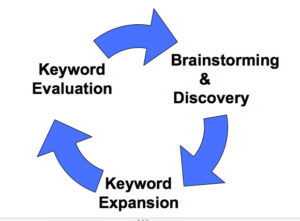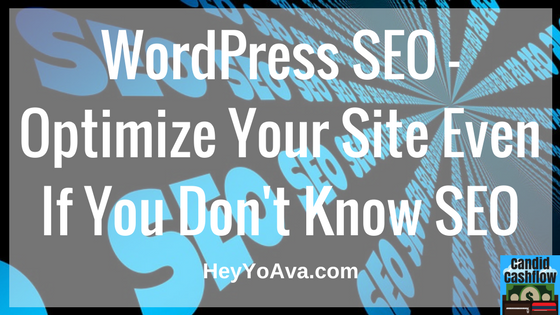Last Updated on September 28, 2022 by Ava

In a hurry? Grab this post in PDF format <<< -OR- Pin it to Read Later!
This episode is sponsored by Skillshare.
There are more than 200 courses about SEO available on Skillshare. Some of them are taught by industry experts like Rand Fishkin, the co-founder of Moz.
There are even specific courses on WordPress SEO, so Skillshare is a great resource to educate yourself.
 Search Engine Optimization is an interesting and controversial topic. I have to insert a small disclaimer here, and say that I do not claim to be an SEO expert. I just know things about stuff, and have the t-shirt to prove it.
Search Engine Optimization is an interesting and controversial topic. I have to insert a small disclaimer here, and say that I do not claim to be an SEO expert. I just know things about stuff, and have the t-shirt to prove it.
My SEO knowledge comes from first learning the bare minimum to write SEO articles back in 2006. After that, I learned how to optimize my WordPress website using All In One SEO Pack which means I had no special skills at all really. More recently, I was trained in Local SEO which is different from just regular SEO, but as a part of that training, I learned the difference between the two.
Since then, I’ve optimized my own sites as well as one for a client that had been moved. It was an SEO nightmare. She now gets more than 3,500 unique visitors per month consistently. She could get a lot more by upgrading her content. We’ll talk more about upgrading content a little later.
So, I wouldn’t consider myself an expert, but I know enough to get the job done. Perhaps that’s where you would like to be also. That’s why I’m here. I may not always be able to hand out expert information, but I can lift you at least to my level and point you in the right direction.
Let’s talk SEO!
The Brief and Boring History of SEO
Well, you might think it’s boring, I don’t know. I don’t.
Search engines became a thing in the 90s as the Internet was becoming a household term and PC prices were plummeting.
The first search engine wasn’t Google or Yahoo, it was called Architext. It was developed by 6 students at Stanford in 1993. If you’re been bumping around online for a couple decades, you will recognize it by the later iteration of its name as Excite.
A quick succession of search engines followed like Alta Vista, Infoseek, Lycos, and Yahoo. At this time, SEO still wasn’t a thing. The search engine business model was advertising though, so it didn’t take long for people to realize they could manipulate search results with a few quick changes and make money. SEO was probably one of the first ways to make money online soon after content writing, website development, and other things in the service realm.
In the early 2000s, Google took off. That’s really an understatement. Google became an everyday word that turned into a verb anytime we wanted to know anything: Google it!
 I remember personally switching from using Yahoo as my search engine to Google around 2003. I remember when Gmail was invite only. I have watched Google dominate search, and pretty much the entire Internet in the last nearly 2 decades. I’ve watched them revolutionize Smartphones. I’ve seen the evolution from small company created by a couple college students to a crazy monopoly bent on Internet world domination. I’ve gone myself from intense fandom to extreme caution, but I just can’t seem to unmarry myself from the enigma that is Google.
I remember personally switching from using Yahoo as my search engine to Google around 2003. I remember when Gmail was invite only. I have watched Google dominate search, and pretty much the entire Internet in the last nearly 2 decades. I’ve watched them revolutionize Smartphones. I’ve seen the evolution from small company created by a couple college students to a crazy monopoly bent on Internet world domination. I’ve gone myself from intense fandom to extreme caution, but I just can’t seem to unmarry myself from the enigma that is Google.
As they dominated the search engine industry and pretty much obliterated any competition, Google has also dominated SEO. There’s not a website online that is actively competing in their niche that isn’t bowing to the Google gods.
Unless you’re the POTUS or the Pope, you don’t have the audience to drive the traffic you need in today’s competitive world online. Your best tool, or weapon rather, is SEO.
The First Rule of Search Engine Optimization
![]()
I’m going to establish this here and now, and then ignore it for the duration of this episode.
Optimize your website for humans, not for search engines.
SEO was never meant to be a thing. Google is very mysterious about the exact combination of techniques it takes to crack their algorithm in favor of your website. They like to discourage SEO out of one side of their mouths while they give advice out of the other side.
It is the SEO’s job to decipher all of that rhetoric. Those making a living from SEO utilize an array of software and websites to help them stay on top of the game, and it is indeed a game.
Just like any game, there are two sides of players: the light side and the dark side. There is white hat SEO which is what we’ll be discussing here, and there’s black hat SEO which is a brand of SEO that exists to exploit any and all loopholes in Google’s armor.
Don’t Waste A Lot of Time and Money on SEO
I’m here to simplify SEO for you. You can accomplish a lot with a little common sense and some basic skill.
There are agencies that make millions through SEO. It can be very tedious and time-consuming, thus it can also be very lucrative if you can get results for businesses. Many of these agencies hook you and keep you paying through acquired knowledge, and what you think is demonstrated expertise when they’re just following a few set rules. They are getting results for you because the competition is weak. This tends to be the case especially on a local level.
 Don’t pay these clowns your hard-earned money unless you are getting an insane ROI from their efforts.
Don’t pay these clowns your hard-earned money unless you are getting an insane ROI from their efforts.
As a former Local SEO trainee, SEO companies are flashy. They show you a bunch of screen shots that look good. For the majority of the clients during my training, I found that after the initial investment of several hundred dollars, the work was outsourced overseas, and the money was pocketed to keep up a posh lifestyle in Cancun.
If the results didn’t happen, no further charges were incurred, and they moved on to the next sucker. If there were results, the client was charged several hundred more dollars to maintain the work.
I had a client as a Virtual Assistant who had paid a well-known company that may or may not start with a Y to do some Local SEO for him. They promised him like 19 listings in business directories online and charged him $300 and some change for it per year. The problem was that they weren’t maintaining the listings, so no less than 4 of them had been deleted and the links redirected back to the SEO company’s website.
Basically, they had done about a day’s work to set up his listings, and that was all they ever did, but were still charging him every year. In addition, they were holding all of his listings hostage. He had no control over the content on them or access to them in any way.
After I went in and audited the work they were supposed to be doing for him and told him what was really going on, he called them and was refunded $900. They threatened him with his accounts being taken offline. I spent a day, and created new listings for him and put all the log in information in a spreadsheet for him. I’d already done equal to 2 years and $900 worth of what they had done.
So having been on the inside of an SEO company and then having this experience with my client, I now know that paying for SEO is not a wise investment.
Yes, it’s tedious, and you probably don’t have time to mess with it if you’re the CEO of something big, but if you create a few accounts and implement a few rules with your content, you will be head and shoulders above everyone else.
Two Types of Search Engine Optimization
Wow, this is a lot to cover. I thought this episode would be short!
There are actually 2 types of SEO:
- Local
- Organic
You can circumvent both altogether and pay for your ranking with PPC ads if you are made of money. A little SEO skill can save you alot of cheddar though.
The difference between the two is that Local SEO is for local businesses and Organic is for national or global web endeavors. So, if your business isn’t location-specific, you’ll want organic SEO and it’s actually a little easier.
I’m going to venture to guess that most of you fit in the organic side of SEO like me. If you do run a local business, the main differences between the two will be that you add location-specific language to your keywords and you do business listings called citations.
Be sure to visit the the blog and/or grab the show notes as I’m including a link to the top 50 citations for the United States, Canada, the UK, and Australia.
The absolute key to Local SEO is maintaining consistent NAP, or name, address, phone number across everything you do online.
I had another client who was paying somewhere in the ballpark of $399 per MONTH to another SEO company who will remain nameless. That company, did a website for him, handled all of his citations, and tracked his phone calls. The main problem with them was that they changed his phone number to one they had applied this tracking to. They could then tell him how many calls they referred to him, but they had completely devastated his online SEO because his NAP was inconsistent.
Beware. Many of the so-called SEO experts online are basically extortionists. I hate to say it, but it’s the truth. A lot of the big corporate SEOs charge a ton of money and do a lot of nothing. They will probably do a ton of the work in the beginning so they have something to show you for your investment, but they tend not to do much after the initial set-up. This was true both for the company I trained to work with (I didn’t take the job, by the way.), and the companies for both of the clients I’ve mentioned here.
 WordPress SEO Is Super Simple
WordPress SEO Is Super Simple
WordPress and SEO go hand in hand. I’d have to say that WordPress sites are probably the easiest to optimize. They also index quickly. Since WordPress launched in 2005 after the onset of the SEO era, it’s pretty much built for optimization.
There are several plugins for WordPress that make it even easier. I know, and have used, the 2 most popular:
- All-In-One SEO Pack
- Yoast SEO
I used AIO until I found out about Yoast and have used it ever since. The features make it super easy to optimize your WordPress site. Initially, it has a wizard that runs you through the main optimization like keywords and meta description for your site as a whole. It also has places where you can link to Google Search Console, as well as the webmaster tools for both Yahoo and Bing.
In addition, it has an updated list of optimizations for each Page and Post with a sort of stoplight indicator so you know when you’re getting hot. For example, a red dot indicates your content and optimization need improvement while green indicates that you’re doing a bang up job with both.
Basic Keyword Research
SEO always begins with some basic keyword research. Keywords are words and phrases that people type into search engines looking for your niche, business, etc.
Keywords can be highly competitive because you want someone searching for your niche or business to see you on top of the search results. The #1 result in Google is prime real estate. That spot can make both you and Google tons of money.
As a small business, you are going to want to focus on less competitive keywords. These are usually longer phrases and are referred to as long-tail keywords. There is also a lot of money to be had here, but the investment in search position or rank is much cheaper.
For example, let’s say you are a website designer in Sarasota, Florida. << I just picked that city at random. Your main keyword would be “website designer”, but the competition for that keyword on a national and global scale is through the roof. There’s no way you will ever rank for that keyword.
However, if you make it “website designer in sarasota”, there is a possibility you could pull off a #1 ranking there.
This is where SEOs start to implement tools to help them analyze keywords. A lot of those tools are good at what they do, but they’re also overpriced.
I just use Keyword.io. I type in my main keyword, and let it generate long-tail keywords for me. Then I plug those into Keywords Everywhere to get search volume data and I focus on the ones in the tens of thousands range.
Be sure to visit the blog or grab the show notes for a video link to a tutorial where I demonstrate this technique.
This is very basic keyword research, but it works pretty well.
 A Few Guidelines for Creating Optimized Content
A Few Guidelines for Creating Optimized Content
There are a few guidelines you should keep in mind when you create content. This is where you plug in your keywords.
Step 1. Craft a headline that includes your main keyword. Your headline should be between 80 and 160 characters in length.
Step 2. Include your main keyword in your first paragraph.
Step 3. Include your main keyword in an H2 heading in your article.
Step 4. Include your main keyword, as well as a few additional keywords throughout your copy.
Step 5. Craft a meta description that contains your main keyword. Your meta description can be up to 300 characters in length.
Step 6. Include your main keyword in the URL of your content.
Step 7. Include an image with an alt tag that contains your main keyword.
At this point, Yoast should be showing you a green dot. It’s already showing me one for the accompanying post for this episode. Grab the show notes, I’ll include my keyword and meta data so you can see an example.
If you prepare ahead of time with your keyword research, then optimizing your Posts and Pages just takes a few minutes extra. It will pay dividends in the long run.
Tracking Your Results
It will all be for naught if you don’t track your results. I like to use a plugin called Slimstat to analyze my sites simply because it’s easier to use than Google Analytics. However, Google Analytics is really good at tracking any and everything on your website.
Matthew Woodward really has a great tutorial on how to use it on his website which I’ve conveniently linked up for you at https://heyyoava.com/trackanything.
What To Do If Your Results Are Negative
Let’s say you’ve optimized your website, you’re tracking your results, and they’re just no good. You’re getting no results for your effort. The only way to fix it is an upgrade. You’re either going to upgrade your knowledge or upgrade your content.
There are a lot of factors that affect SEO. A few of the main ones are site speed, mobile-friendliness, backlinks, and user-friendliness.
In recent years, Google has begun to lean heavily on the user experience of a website. They return results of the website that has the best answer to the query and is optimized to deliver that answer to the user in the least amount of time.
Make sure that things like the navigation on your website take visitors where they want to be. It may be a good idea to conduct some user testing or have a focus group for your site. You can also use a heat map to analyze where users are clicking the most on your website and what pages they normally exit your site on.
Websites are data mines. The more data you mine and analyze from your site, the more you know about your audience. Knowing more allows you to deliver, and well, that’s the goal here.
Here are a few things to try if your site isn’t getting the desired results. Please note links to more info will be on the blog and in the show notes:
- Hire an expert
- Check your site speed and learn how to optimize it for speed <<< This is an upcoming show!
- Try different or additional keywords
- Upgrade your content – Use your analysis to find out what your audience is looking for and provide it! Make sure you cover the topic thoroughly. The most thorough content will be rewarded the best search rank
- Is your site responsive or mobile-friendly? Most of them are these days especially if you’re using WordPress, but just in case…if it’s not, this is a must-fix
- Produce content regularly
- Get some authority backlinks – Backlinks are websites that “link back” to your website. The higher quality the sites linking to you, the more regard you get from Google
Optimizing and improving a few of these should get you the results you were lacking before.
That’s a Wrap
Once you take the time to gain a little understanding, WordPress SEO becomes second nature. If you’re in an obscure niche, you can absolutely dominate your niche and possibly secure that #1 spot just with the tactics I’ve outlined in this episode.
My client does well in the wellness niche. I have another client who does well in the self-publishing niche. Basic SEO works.
As far as advanced SEO, you have a couple options, you can increase your knowledge, or you can hire someone. Just be cautious about who you hire because you don’t want to be paying hundreds of dollars to someone who’s not really doing much of anything.
Thanks for listening! If you found something I said helpful, I hope you will consider subscribing to The Candid Cashflow Podcast. You can do so in your favorite podcast app at http://HeyYoAva.com/CandidCashflow.
While you’re there, subscribe to my weekly newsletter. I publish both every Wednesday!
Stop by and leave me a comment.
Until next time, turning your passion into cashflow!

